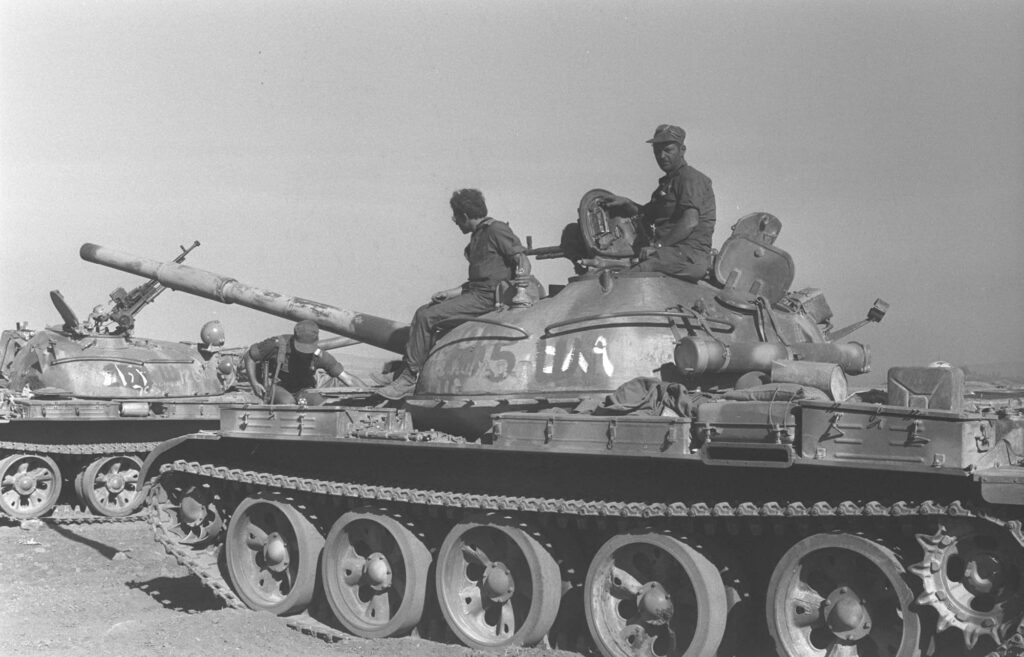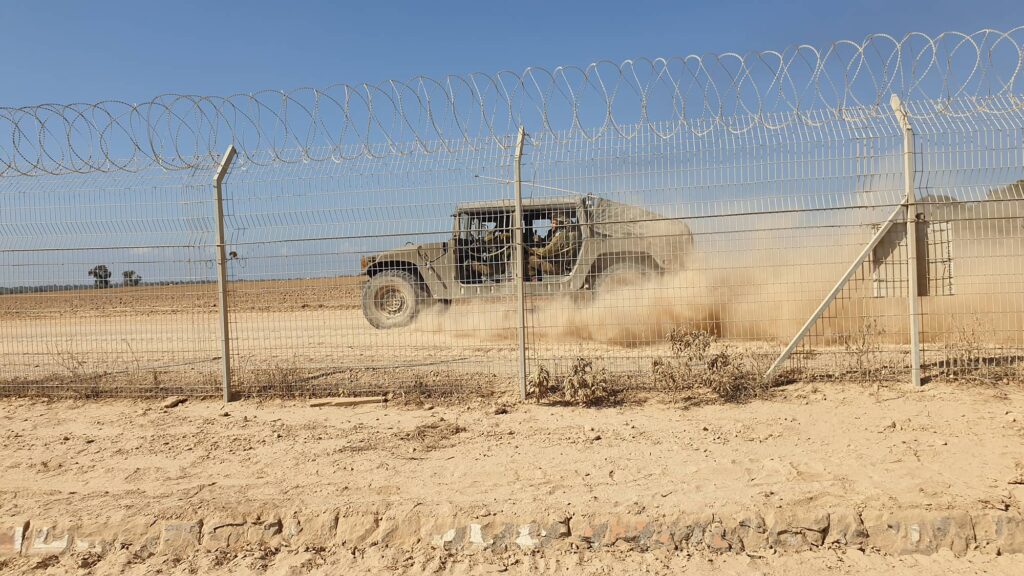The best defense is a good offense. Or is it, really? October 7, 2023, the costliest day in Israel’s history, provides a stark lesson. Sometimes going on the offensive is better, and a surer way to victory, than waiting for the enemy to land the first blow. But not always, and as a state of mind it may have catastrophic consequences. One of the seminal studies of Pearl Harbor was titled “At dawn we slept.” That epitomizes what happened on the savage sabbath in the western Negev bordering Gaza.
The Israeli failure in the pre-dawn hours of October 7 was only partly an intelligence failure. What collapsed was an entire military culture, of which early warning was but one link in a chain. That link was certainly broken, but so were several others. Had they remained intact, the attack would have been repulsed at bearable cost, despite the surprise caused by an intelligence failure.
>> Inside Intelligence: Read more from Amir Oren
A Doctrine of Going on The Offense
The name “Israel Defense Forces” points to the IDF’s legacy, preceding the 1948 establishment of the State of Israel. Almost since its inception, however, the IDF strove to adopt George Washington’s dictum that offense is often the surest means of defense.
In the early decades of the 20th century, Jewish settlements and neighborhoods in Palestine, under Ottoman and later British rule, were routinely attacked by local Arabs. A natural Jewish response was to organize protective groups. Their names, HaShomer (the Guardian) and later the Haganah (Defense), expressed both their purpose and their protocol. Only from the mid-1930’s onward, tutored by the unconventional British officer Orde Wingate, did these youth, among whom were future generals and statesmen like Moshe Dayan and Yigal Allon, dare to “go over the fence” and undertake offense.
Israel embraced offense – taking the battle to the enemy – as the most essential element of its unwritten security doctrine. The nation, in its 1949 to 1967 configuration, was vulnerable to attack from all four land borders, in addition to aerial bombing campaigns and potentially even a Mediterranean landing. Its resources would not suffice to defend everything, everywhere, all the time. Most alarming was the geographical reality just north of its main urban hub, Tel Aviv, where a sudden armored thrust from the Jordanian-held West Bank could dismember the country at its 10-mile wide waist. For Israel’s planners and leaders, this meant that they could not afford to simply lie in wait. In wartime, removing the threat meant going as fast as possible on the offensive.
Overreliance on Intelligence
What would give the young country the ability to go on the offensive? The overwhelming needs of the state in its early years were to absorb millions of refugees and give the population a robust social and economic foundation. These needs ruled out the option of basing the IDF on a large standing army of volunteer men and women. The solution was a double-phase structure. A skeletal cadre of officers and NCO’s would plan operations, maintain equipment and train draftees, who following their two or three-year conscription would be posted to reserve units, refreshing their skills in annual exercises and mobilizing in an emergency.
The crucial difference between calling up the reserves too early – a false alarm – and too late is the quality of intelligence. It must be based on career personnel, experienced and up-to-date in the arts of collection and assessment, augmented by draftees and reservists. The same would apply to the other branches on constant alert – the air force and the (much smaller) navy.
The intelligence community in Israel has three powerhouses. Two of them, Mossad (external) and Shabak (internal), are patterned on Britain’s MI-6 and MI-5, respectively, and are civilian bodies (and even more centralized than the military) answerable directly to the Prime Minister. The third, Aman (the Directorate of Military Intelligence), is a uniformed service, providing intelligence at the national level to the IDF, the Defense Minister and the Cabinet, presided over by the Prime Minister, the ultimate recipient of the intelligence product.

The various intelligence organizations had several missions and responsibilities throughout the years, and Aman in particular had several tasks, ranging from strategic assessment at the national level to micro-tactical information vital to the rifleman on the line, Still, there was no disputing the priority of an early warning that a war is about to break out. The significance is comparable to a supposedly healthy person being subjected to a continuous check-up, lest a malign illness suddenly appears, too late to be cured.
Fine in theory, but the term “early warning” was far from self-explanatory. Warning against what? An imminent attack by a massed Arab army close to the border, sure. But what else?
For one, the opposite of war – peace. When Anwar Sadat came up with his 1977 peace initiative, Aman was as surprised as it had been four years earlier by his crossing of the Suez Canal. In analyzing Sadat’s options earlier that summer, the Egypt watchers in Aman were divided between those who predicted he would choose war again and those who foresaw a resumption of the expiring ceasefire. Only one young junior officer said, “there’s a third option, he might go for peace.,” His colleagues joined in hearty laughter. His boss, the Aman director, later refined the early warning tasking to include all significant changes, whatever their direction.
This sort of alert could be characterized as strategic. It had far-reaching, national implications. Calling up the reserves and deploying the standing force could save the country – or sink the economy. An alarmist intelligence service will soon cease to be useful. Caution thus had to be two-dimensional. The most senior officers in charge of assessing the certainty of imminent attack – the major general heading Aman and his one-star assessment chief – were always walking on a razor’s edge.
And while the fear of another Yom Kippur surprise receded following the peace pact with Egypt – because without an Egyptian front it was unlikely Syria would launch another war – there were other threats. They could be cataloged as merely operational or even tactical, but because of their ramifications were nevertheless strategic in the Israeli context.
A case in point was the Elath, an Israeli destroyer sunk in 1967 by Egyptian missile boats, with 50 sailors killed, because of a short-circuit in communications between Aman and the Navy. Or take Munich, the hostage taking and massacre during the 1972 Olympic Games, after which security officers were quietly fired. A third case was the Rabin assassination in 1995, a massive failure of the Shabak, Israel’s FBI, which is charged with monitoring violent Jewish extremism.

Why Israel Disregarded Warnings
In all of these and other events, there were leads left unexplored, with catastrophic results. The common denominator was complacency, imbued by a disdain for protocol and procedure. Assigning this problem to an Israeli character trait, typical of a people who put a premium on ingenuity and improvisation over mundane manuals, would not do full justice to it.
If the unique characteristic of the American, as captured by Alexis de Tocqueville in the 19th Century, is the Entrepreneur, then his Israeli counterpart is the Pioneer, leaving the comfort zone for the frontier with its ever-present dangers. This seemingly called for a pro-active, offensive-minded fighter. Alpha males joined the combat units which charged and assaulted. Those who stayed behind to guard the settlement, its females and children contributed their fair share, per their abilities, but were not so highly regarded.
In the IDF combat arms, infantry and armor are the “assault” branches where the risk to a soldier’s life is quite real. They are more highly regarded than “support” branches such as artillery and engineers. Promotion to top positions is almost exclusively given to infantry, Special Forces (often also Paratroops) and armor leaders. They are all expected to be aggressive and actively spoiling for a fight. In a similar vein, an aviation cadet would want to be a fighter pilot, not a weapon systems officer/navigator and would be disappointed at relegation to helicopters or cargo.
There is no glory in guard duty. 99.9 percent of the time it’s repetitive and boring. It is easy to believe that today will be as uneventful as yesterday and all of the preceding days. There are very special exceptions. One presumes that the Dimona Nuclear reactor is heavily guarded, no slack allowed. But this is the rare case where failure is obviously catastrophic. In most other cases, the prevailing mood among those young Israelis in uniform, not supervised tightly enough by their slightly older officers, is “what’s the worst that could happen?”
In theory, everyone understands that an offensive team is useless without its defensive mates. Israel’s current Chief of General Staff Hertzi Halevi even used this football metaphor when he researched the problem of border defense, and especially the scenario – which was studied -of a Hamas raid intended to kill and abduct. He had been assigned to this assessment. At the time, Halevi was commander in chief of Southern Command, in charge of Gaza, and a former Aman chief, with plenty of intelligence and operational experience.
The fact that intelligence failed in the case of October 7 is self-evident. A veteran warrant officer focusing on Hamas doctrine and training alerted her superiors to indications that the so-called “Jericho Walls” plan was about to be put into motion. Her warning was duly registered, but not believed. Though she credibly described what Hamas had in mind, the question was raised: can such plans be carried out? Hamas was not assessed as a serious ground threat, and its other two options for attack – through underground tunnels and missiles and rockets – were generally taken care of by counter-tunnel obstacles and by Iron Dome. Hence the assumption that Hamas was deterred – by both the expected cost to it and the denial of its options.

The Unthinkable – Bringing the War Home
The IDF’s real problem is structural. The General Staff is also the army headquarters, with the ground forces staff only in charge of training and equipping the units, not connected to deploying them. Operations are planned at IDF HQ in conjunction with the Air Force, Navy and Territorial Commands, but there, too, they are mostly offense oriented. “Taking the fight to the enemy’s area” is a hallowed principle.
Thus, the entire effort of the intelligence community – Aman (both at the National and General Staff levels and down to field levels), Shabak and Mossad – is to look outwards, with no regard to what happens if the enemy not only attacks, but actually manages to breach the defenses. Each city block in Gaza can have an updated file, with measurements and simulated entrances through doors, windows and roofs, should the need for targeted killings arise. There was none for the kibbutzim which came under attack.
To be prepared for the October 7 massacre, as distinct from the initial Hamas success in penetrating the border, would have required thinking about the unthinkable, imagining the unimaginable.
As Israel emerged from its 1948 war of independence, its founding prime minister (who was also defense minister) David Ben-Gurion set up a Frontier Force, as part of the IDF. But it was not counted in its order of battle for general war. It was intended to take care of infiltrators, mostly Palestinians who had left their homes during the war, willingly or otherwise, and now wanted to return to resettle, steal, or avenge. The Frontier Force was soon reassigned to the Police, where it was renamed and re-uniformed as the Border Patrol. But the basic idea remained – mostly career personnel (many of whom were Israeli Arab or Druze inhabitants of the area) with deep personal and organizational memory of the sector and its problems.
Several years ago, in one of the many re-organizational efforts to delineate the relationship between Aman – and within it, field intelligence and reconnaissance – and Ground Forces Command, a military Border Defense Corps was set up. Its battalions are primarily assigned to specific areas along the peaceful borders with Egypt and Jordan. The corps is not considered proficient enough to take part in offensive operations. Commanding it is not a career-enhancing opportunity, except for female officers, some of whom have indeed excelled over the years and once again on October 7. (This is also true of missile defense, which in the IDF is under the air force.) Had they been on guard on the Gaza border, readiness would probably have been higher than it was in the case of the elite infantry units who were there on temporary duty on October 7 and who fought bravely but barely knew where they were.
The Home Front Command, too, much like the rest of the military, looked towards the missile threat on the civilian population. They looked upwards but not straight ahead. It had no ready reserves to send to communities under attack. The so-called Ready Squads in the settlements were under-manned, under-funded and under-equipped. Their chain of command ran to the territorial brigades of the Gaza Division, but all three headquarters of the Division and its brigades were housed together, convenient for the administrators but also for the attackers. With command, control and communications cut, these squads, made up of residents-reservists, performed heroically, waiting in vain for rescue and reinforcements.
There are other lessons learned, but the single most important one is to prepare defensive measures for a surprise scenario, even when it is assessed as not very plausible, let alone when the enemy is evidently training to execute one. A Hamas onslaught was way down the list of probable threats.
Given that surprise is inherently inevitable and its cost may be unbearable, as in October 1973 and October 2023, the essential IDF planning ingredient is that the attack will be a bolt out of the blue, and defensive measures should be there even when it happens.
The IDF’s Gaza Division, the Southern Command, the General Staff and the Cabinet should have based their planning on being given little to no early warning. In the months and perhaps years leading to October 7, Hamas leader Yahya Sinwar put Netanyahu and the IDF to sleep, by making them believe his inaction reflected effective deterrence. Intelligence is supposed to deliver a wake up call, but the operations side of the house must not rely on intelligence to deliver that call. It must not be so complacent as to slumber soundly at dawn, because this could mean the difference between a mere failure and a national disaster.

